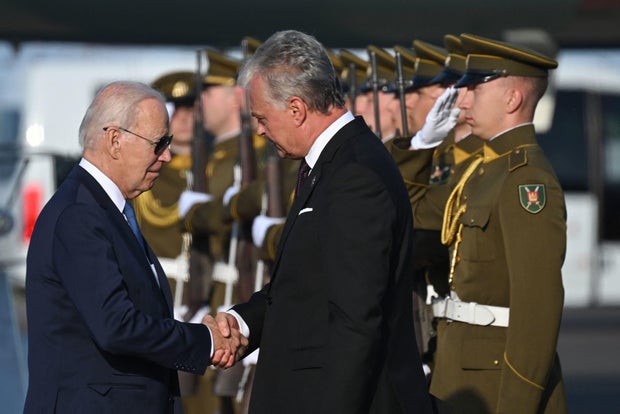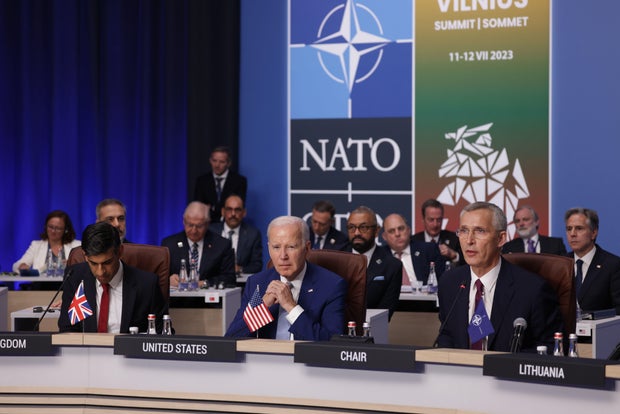Vilnius, Lithuania — President Biden was in Lithuania Tuesday for crucial meetings with America’s NATO allies. The leaders have a lot to discuss at their two-day summit, but the focus will be almost entirely on Russia and the threat it poses to eastern Europe as Vladimir Putin continues his war against Ukraine.
The leaders managed to kick off their summit with a win even before it officially started. An agreement was announced Monday that has seen the government of current NATO member Turkey drop its opposition to Sweden joining the alliance.
With its powerful navy, Sweden’s pending accession to the transatlantic alliance is another signal to Putin, the NATO leaders say, that his unprovoked war has backfired, uniting the West against him rather than dividing his global adversaries.
Putin’s invasion of Ukraine quickly sparked bids for NATO membership by two long-unaligned Nordic nations, Sweden and Finland. Finland’s bid sailed through, and the country became the 31st member of the alliance in April.
Speaking Monday after his arrival for the summit, Mr. Biden said he was, “looking forward to convening very soon with 32 members, with the addition of Sweden.”
This week’s summit is the first meeting of NATO leaders since the Wagner mercenary group staged its brief, aborted mutiny in Russia last month.
Russia’s government said Monday that Putin had met with Wagner’s leader, Yevgeny Prigozhin, five days after the uprising, but the shadowing businessman long believed to be a close Putin associate has not been seen publicly since his failed putsch.
The incident has further unsettled NATO countries near Russia, including the Baltic states like Lithuania, whose president met with Mr. Biden on Tuesday.
“Our situation is unfortunately deteriorating,” President Gitanas Nauseda told Mr. Biden.
ANDREW CABALLERO-REYNOLDS/AFP/Getty
Protecting NATO’s eastern flank from an increasingly unstable Russia was at the top of the agenda for Tuesday’s meetings, and the U.S. president vowed the alliance would “defend every inch of” its territory.
As Russia’s assault on Ukraine enters its 17th month, the leaders gathered in Vilnius have said they’ll unveil a long-awaited reform path that Ukraine can take to someday join NATO itself.
Ukraine’s government has sought membership for years, but the Biden administration and some European NATO members have been wary of initiating the accession process while Ukraine is actively engaged in a war with Russia. Under the NATO charter’s common defense principle an attack on one member is treated as an attack on all, so the concern is that if Ukraine were to become a member, the U.S. and all of its NATO allies would suddenly find themselves engaged directly in the war with Russia.
Sean Gallup/Getty
In a terse statement posted on his social media channels Tuesday, Ukrainian President Volodymyr Zelenskyy called his Western partners’ reluctance to establish a clear timetable for Ukrainian membership “unprecedented and absurd.”
He took a preemptive jab at the path to membership expected to emerge from the NATO summit, bemoaning the “strange wording” being discussed among the bloc’s leaders and the “conditions” they’re expected to impose “for inviting Ukraine.”
“It seems that there is no willingness to invite Ukraine to NATO or make it a member of the Alliance,” wrote Zelenskyy a day before he’s expected to sit down for a meeting with Mr. Biden in Vilnius. “This means that it remains possible to bargain Ukraine’s membership in NATO in negotiations with Russia. And for Russia, this means motivation to continue its terror. Uncertainty is weakness.”
Asked in Vilnius how long he thought it would take Ukraine’s government to make the required reforms once the war with Russia does end, U.S. national security adviser Jake Sullivan said he couldn’t “put a timetable on it.”
“I don’t believe that you will see that coming out of here,” he said of this week’s NATO summit. “This is about the substance of democratic and security reforms and getting those right.”
The Russians have labeled even the prospect of Ukraine’s future membership a “threat,” and Moscow has warned ambiguously that it would draw a “reaction.”
That has come as no surprise to the leaders gathered in Vilnius, as Russia used Ukraine’s NATO aspirations as a rationale for its unprovoked war in the first place.


